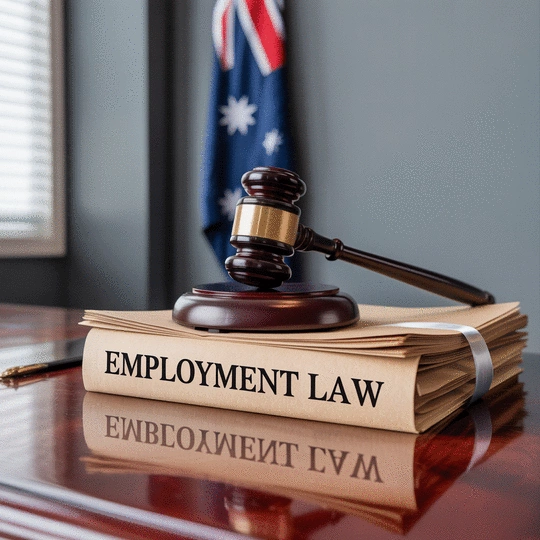Unfair Dismissal Laws in Australia

Posted on: 2025-10-25
By: Clara Thompson
Understanding unfair dismissal laws can be the difference between a fair workplace and a costly legal battle. With the right knowledge, both employees and employers can protect their rights and foster a healthier work environment. Here are the vital lessons you'll take away from the discussion on unfair dismissal laws in Australia.
What You Will Learn
- Unfair dismissal occurs when an employee is terminated without a valid reason, which can lead to legal claims and compensation.
- Employers must have clear dismissal procedures in place to justify terminations and avoid disputes.
- It's crucial to distinguish between unfair dismissal, wrongful dismissal, and unlawful termination to navigate your rights effectively.
- The Fair Work Commission and Fair Work Ombudsman provide essential support and guidance regarding unfair dismissal cases.
- Employees must meet specific eligibility criteria before filing an unfair dismissal claim, including length of service and grounds for dismissal.
- Understanding income thresholds and exceptions is essential, as high-income earners may need to pursue contractual claims instead of unfair dismissal claims.
- Familiarity with your employment contract can empower you to advocate for your rights and understand statutory protections in case of dismissal.
Understanding Unfair Dismissal Claims
The following key points summarize the eligibility criteria and distinctions between unfair dismissal, wrongful dismissal, and unlawful termination:
Eligibility Criteria for Unfair Dismissal Claims
- Minimum 6 months of continuous service.
- Dismissal not due to serious misconduct.
- Not classified as high-income earners or under specific exemptions.
Types of Dismissal
- Unfair Dismissal: Harsh or unreasonable terminations.
- Wrongful Dismissal: Breach of contract, e.g., failing to provide notice.
- Unlawful Termination: Violations of anti-discrimination laws.
Roles and Responsibilities
- Fair Work Commission: Hears unfair dismissal claims.
- Fair Work Ombudsman: Provides guidance on rights and obligations.
- Support Services: Resources for navigating dismissal issues.
Consequences of Unfair Dismissal
Claims can lead to compensation or reinstatement, affecting both employees and employers significantly.
Clarifying Unfair Dismissal Laws in Australia
Understanding unfair dismissal is vital for both employees and employers. In essence, unfair dismissal occurs when an employee is terminated from their job in a way that is considered harsh, unjust, or unreasonable. This can lead to significant implications, including the potential for legal claims and compensation. It's important to grasp how these laws operate to ensure fair treatment in the workplace.
For employers, navigating unfair dismissal laws can help avoid costly legal disputes and enhance workplace morale. Employees, on the other hand, must know their rights to protect themselves from unjust treatment. At Employment Law Solutions, we aim to simplify these complex issues so you can make informed decisions.
Understanding the Basics of Unfair Dismissal
So, what exactly defines unfair dismissal? Generally, it refers to a situation where an employee believes they have been fired without a valid reason or without the proper process being followed. The implications can be serious; employees may seek compensation or reinstatement, leading to considerable costs for employers.
It's critical for employers to have clear policies and procedures in place when it comes to dismissals. By doing so, they can demonstrate that any dismissals are justified. For employees, knowing the grounds for claiming unfair dismissal is essential. If you've ever felt dismissed unfairly, consider this: Did your employer provide a valid reason for the termination? Was the process followed properly? Understanding these points can empower you to stand up for your rights.
- Unfair dismissal occurs without a valid reason.
- Employers must follow proper procedures during termination.
- Claims can lead to compensation or reinstatement.
Distinguishing Between Dismissal Types
It’s important to differentiate between unfair, wrongful, and unlawful terminations. Unfair dismissal focuses on whether the dismissal was harsh or unreasonable. In contrast, wrongful dismissal typically revolves around the breach of contract, while unlawful termination relates to breaches of specific laws, such as discrimination laws. More information on recognizing unfair dismissal can be found via the Law Society of New South Wales.
Here are some key distinctions to keep in mind:
- Unfair Dismissal: Harsh, unjust, or unreasonable terminations.
- Wrongful Dismissal: Breach of contract, such as failing to provide notice.
- Unlawful Termination: Dismissals that violate anti-discrimination laws.
By understanding these terms, both employees and employers can navigate their rights and responsibilities more effectively. At Employment Law Solutions, I often emphasize the importance of clear communication and documentation. This can save everyone involved a lot of time and stress!
Role of the Fair Work Commission and Fair Work Ombudsman
The Fair Work Commission (FWC) and the Fair Work Ombudsman (FWO) play essential roles in managing unfair dismissal cases in Australia. The FWC is primarily responsible for hearing unfair dismissal claims, while the FWO provides guidance and support regarding workplace rights.
Here's a closer look at their functions:
- Fair Work Commission: Handles claims and provides resolutions in dismissal cases.
- Fair Work Ombudsman: Offers advice on rights and obligations of employees and employers.
- Support Services: Both organizations provide resources to help navigate unfair dismissal issues.
Utilizing the resources and expertise available from these bodies can greatly benefit both employees and employers. If you're uncertain about a dismissal situation, I encourage you to reach out to the FWC or FWO for clarity. Remember, understanding your rights is the first step towards advocating for them!
Eligibility Criteria for Unfair Dismissal Claims
Key Eligibility Requirements
To file an unfair dismissal claim, employees must meet specific eligibility criteria. Generally, this involves having been employed for a minimum period and not having been dismissed under certain circumstances.
Here are the fundamental requirements to consider:
- Employees must have completed at least 6 months of continuous service.
- The dismissal must not have been due to serious misconduct.
- Employees should not be classified under specific exemptions, like high-income earners.
As a legal expert specializing in Australian employment law, I cannot stress enough how crucial it is to determine eligibility before proceeding with a claim. It can save you time and effort down the track!
Income Thresholds and Exceptions
Within the realm of unfair dismissal claims, there are income thresholds and exceptions that employees need to understand. For instance, high-income earners, typically those earning above a certain threshold, may not be eligible to make an unfair dismissal claim.
Here are some key points regarding income thresholds:
- High-Income Threshold: Employees earning above a set amount may need to resort to contractual claims instead.
- Small Business Exceptions: Businesses with fewer than 15 employees have specific rules that apply.
- Contractual Claims: High earners must rely on contractual terms for disputes.
Understanding these conditions can significantly impact how a claim is approached. If you find yourself in this situation, I recommend reviewing your employment contract closely or consulting with a legal professional to clarify your options!
Understanding Employment Contracts and Employee Rights
Your employment contract is a powerful document that outlines your rights and obligations as an employee. It can also play a significant role in unfair dismissal claims. Familiarizing yourself with your contract can help you understand what protections you have under the law.
Here are some essential aspects to consider:
- Key Provisions: Look for clauses related to termination and notice periods.
- Statutory Rights: Employees are entitled to certain rights, regardless of contract terms.
- Legal Protections: Knowing statutory rights can aid in assessing the fairness of a dismissal.
At Employment Law Solutions, I encourage all employees to thoroughly read their contracts. Understanding the fine print can empower you to advocate for yourself effectively in the workplace!
Pro Tip
Before you consider filing an unfair dismissal claim, take a moment to document your entire employment history. Keep records of any communications with your employer regarding your performance, any warnings received, and details surrounding your dismissal. This documentation can be invaluable if your case goes to the Fair Work Commission, as it helps establish the context and legitimacy of your claim.
Frequently Asked Questions (FAQs)
What is unfair dismissal in Australia?
Unfair dismissal occurs when an employee is terminated from their job in a way that is considered harsh, unjust, or unreasonable, often without a valid reason or proper process being followed. This can lead to legal claims and compensation.
What is the difference between unfair dismissal, wrongful dismissal, and unlawful termination?
Unfair dismissal focuses on whether the dismissal was harsh, unjust, or unreasonable. Wrongful dismissal typically involves a breach of contract (e.g., failure to provide proper notice). Unlawful termination relates to dismissals that violate specific laws, such as anti-discrimination laws.
Who handles unfair dismissal claims in Australia?
The Fair Work Commission (FWC) is primarily responsible for hearing and resolving unfair dismissal claims. The Fair Work Ombudsman (FWO) provides guidance and support regarding workplace rights and obligations.
What are the eligibility criteria for filing an unfair dismissal claim?
Generally, employees must have completed at least 6 months of continuous service (12 months for small businesses), the dismissal must not have been due to serious misconduct, and they must not fall under specific exemptions, such as high-income earners.
Can high-income earners make an unfair dismissal claim?
Employees earning above a certain high-income threshold are typically not eligible to make an unfair dismissal claim and may need to pursue contractual claims instead.
How important is my employment contract in an unfair dismissal case?
Your employment contract is a crucial document that outlines your rights and obligations, including termination clauses and notice periods. Understanding its provisions can significantly impact an unfair dismissal claim and help you advocate for your rights.
Summarizing the Key Elements of Unfair Dismissal Laws
Understanding unfair dismissal laws is crucial for both employees and employers in Australia. These laws protect workers from being dismissed in a way that is considered harsh, unjust, or unreasonable. For employers, knowing these laws helps prevent costly legal battles and promotes fair workplace practices.
On the other hand, employees must be aware of their rights and the legal frameworks that protect them. This knowledge empowers them to advocate for their rights and seek justice if they feel they have been unfairly treated. At Employment Law Solutions, I emphasize the importance of being informed about these laws, as they are essential in navigating the complex landscape of workplace relationships.
Call to Action: Seeking Assistance and Further Information
If you find yourself in a situation where you believe you have faced unfair dismissal, I encourage you to consult with legal professionals or reach out to the Fair Work Commission. They can provide personalized advice tailored to your situation, ensuring you understand your rights and options moving forward. Remember, seeking help early can make a significant difference!
Additionally, it’s important to keep updated with the latest changes in legislation, as these can impact your rights as an employee or employer. Don’t hesitate to take proactive steps in understanding how these laws affect you!
Interactive Tools and Resources
To assist both employees and employers, I’ve compiled some valuable resources that can help you navigate unfair dismissal scenarios. These include:
- Self-assessment tools to determine if you might have a claim
- Downloadable templates for filing claims
- FAQs that address common concerns about unfair dismissal laws
These resources aim to simplify the process and provide clarity to all parties involved. At Employment Law Solutions, I believe that having the right tools at your fingertips can empower you in your employment journey.
Engagement and Feedback
Your experiences matter! I invite you to share your stories or questions regarding unfair dismissal laws in the comments below. Engaging with one another can foster a supportive community where we can all learn and grow. What challenges have you faced? What advice would you give to others in similar situations?
By opening up this conversation, we can create a better understanding of unfair dismissal laws and help each other navigate the complexities of employment rights in Australia. Remember, together we can advocate for fairness and transparency in the workplace!
Recap of Key Points
Here is a quick recap of the important points discussed in the article:
- Unfair dismissal occurs when an employee is terminated without a valid reason or proper procedure.
- Employers must have clear policies in place to ensure fair dismissals and avoid legal disputes.
- Distinguish between unfair, wrongful, and unlawful dismissals to understand your rights better.
- The Fair Work Commission and Fair Work Ombudsman provide essential support and guidance on unfair dismissal cases.
- Employees need to meet specific eligibility criteria, including a minimum service period, to file a claim.
- Understanding income thresholds and exceptions is crucial for high-income earners and small businesses regarding dismissal claims.
- Familiarizing yourself with your employment contract can help clarify your rights and obligations in case of dismissal.
 Understanding your rights in the workplace is not just beneficial; it's essential. With 1 in 5 Austr
Understanding your rights in the workplace is not just beneficial; it's essential. With 1 in 5 Austr
 Understanding unfair dismissal appeals can feel like navigating a maze. Did you know that nearly 20%
Understanding unfair dismissal appeals can feel like navigating a maze. Did you know that nearly 20%
 Contract compliance is more than just a legal obligation—it's a cornerstone of effective business
Contract compliance is more than just a legal obligation—it's a cornerstone of effective business
